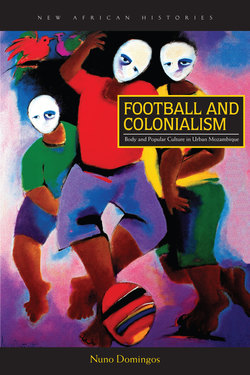Читать книгу Football and Colonialism - Nuno Domingos - Страница 8
На сайте Литреса книга снята с продажи.
ОглавлениеForeword
The bigger picture is sometimes best seen in the littlest details. According to Thomas Hylland Eriksen, the importance of anthropology lies precisely in its ability to examine “large issues” in “small places.”1 That is exactly what Nuno Domingos accomplishes in Football and Colonialism: Body and Popular Culture in Urban Mozambique.
At first glance, the work is about football as it was played in Lourenço Marques—the largest city and administrative center of the Portuguese colony of Mozambique—in the first half of the twentieth century. The work charts the development of the game from the founding of the first football clubs by British expatriates, to the establishment of satellites of Portuguese metropolitan clubs such as Sporting and Benfica, to the opening up of these clubs to African players including mostly elites of mixed racial heritage, to the eventual creation of an African Football Association whose players were mostly working-class Africans living in the poorer periphery of the city where their matches were mostly played.
Historians of football will, of course, be interested to learn more of the sporting context that produced such talents as Mário Coluna and Eusébio, both of whom made their mark in European football in the mid-twentieth century. And football’s claim to be a—if not the—“world sport” will only be strengthened by accounts of the enthusiasm with which urban Mozambicans of varied backgrounds embraced the game so long ago. Domingos’s work is, however, far more than a historical account of the spread of a European (if only in its “modern” form) game to an African colony. The bigger picture with which this work engages is the relationship between colonized and colonizer, seen through the lens of that game.
As such, this account builds upon and extends a social science tradition that has produced rich results in African studies in recent decades, namely the study of “popular culture.” To date, studies of African popular culture have mostly focused on the arts, including sculpture, painting, music, dance, literature, cinema, and theater. Such work has rendered visible the dynamic interaction of tradition and modernity on the African continent, highlighting the ways in which African forms of expression have engaged with the lived experience of historical processes connecting the continent to a larger world, from colonialism, to revolutionary nationalism, to socialism, to neoliberalism. In the mix, Africans have adopted and adapted European genres of expression to their own ends and, as this body of work has shown, contributed profoundly to the global trajectories of these various forms.
Domingos himself adopts and adapts the “popular culture” approach to his ends in this study. He extends the approach to a realm too often ignored by historians and social scientists, namely sport. By seeing how football was played in urban Mozambique through the conceptual framework of “genre,” he dispenses with the assumption that a game—defined as it is by a set of rules—travels unchanged from one social context to another. Like the arts, he shows us, football has been transformed by those who have played it in places like colonial Mozambique. But it is not the transformation of the game itself that most interests Domingos in this work. He is instead most interested in the “larger issues” of how the game of football did or did not transform those who played it in colonial Mozambique, as well as how they were or were not able to use the game to transform the world in which they lived.
What little has been written about sport in colonial contexts has tended to focus on its use as a tool of colonial power. By playing—or, being made to play—the games of the colonizer, it has been argued, the bodies of the colonized have been disciplined and their minds oriented toward new ideas such as “structured competition,” “fair play,” and “the rule of law.” Domingos’s work clearly shows that, to some extent, the Portuguese regime conceived of sport, including football, as a means of “civilizing” natives. But as Domingos demonstrates, this was not an entirely successful project. Urban Mozambicans played the game in ways that both expressed and reinforced their own ways of being in the world, even as they played it, in part, to transform themselves in attempts to gain greater access to a world that too often excluded them.
Domingos’s use of the writings of the protonationalist Mozambican journalist and poet José Craveirinha—who chronicled football in the “cane city” neighborhoods of Lourenço Marques—affords readers an intimate view of the minutiae of the game as it was played by working-class Africans, including the “littlest details” such as descriptive terms, physical gestures, and moral dispositions that animated players and spectators alike in the many “small places” in which they played. On rough makeshift pitches in the midst of the crowded, squalid urban villages that surrounded the “cement city,” humor, creativity, deception, and violence were part of the game, just as they were a part of everyday life for residents of these neighborhoods under colonial rule. Playing the game as they did, urban residents of these “mean streets” simultaneously submitted to the rules of the game and challenged them, while at once resisting colonial power and seeking to capture it. Domingos’s recognition and exploration of defining paradoxes like these gives foundation to an account of rich and subtle detail.
In these pages, football is not “just a game,” but instead the centerpiece of a vivid tableau whose subjects have heretofore remained underexplored. Accordingly, Domingos’s work not only provides missing pieces of the bigger pictures of Portuguese and Mozambican history, not to mention of the history of football, but also offers an exceptionally fine-grained perspective on the lived experience of colonialism in Mozambique—shedding comparative light on such experiences elsewhere—while alerting us to the many and often contradictory potentialities of sport to shape human subjectivities.
Harry G. West
